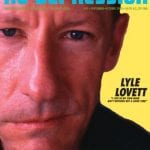Hello Stranger from Issue #47
“In the very old days the elephant, upon the roof of the earth, led an existence deeply satisfying to himself and fit to be set up as an example to the rest of creation: that of a being mighty and powerful beyond anyone’s attack, attacking no one.”
— Isaak Dinesen, Shadows On The Grass (1961)
Among the charms of new parenthood has been the opportunity to watch television at unexpected hours. In our household that has meant an unsteady diet of CNN and VH1, augmented by PBS and any “Law & Order” reruns we haven’t already seen at least twice.
In truth, my sporadic company during these late-night feedings is more a gesture of solidarity than much help. The most I can do is try to make conversation and keep the diapers washed. Cursed by the power of repetition, our three-month-old daughter seems to like the current Train video, and I was able — a little proudly, I fear — to recognize the music bed in a local commercial as having been stolen from Pink’s present hit.
One Friday night a British historian-gone-talking-head noted that we lived in the most entertainment-saturated culture in the history of the world. Nothing profound in that observation, but I had been mulling over some very intelligent letters received (not for publication, and so I’ll not mention the authors here) who questioned the wisdom of politics intruding in these pages.
No, I truly don’t wish to flog the poor beast one more time. Only this: I am troubled by the moral implications of seeking only to entertain, particularly in such volatile times.
Rather more to the point I’m ambling toward here, the somewhat unexpected reaction to my liberal sentiments is a reminder of how much this little magazine has grown and evolved these eight fast-running years. What began as a post-punk impulse has become, especially with the recent demise of Country Music magazine, one of the few venues for a serious discussion of traditional country music. Whatever that is.
Those are rather different audiences, we aging hipsters (OK, I was never hip, but…) lured to our roots by the siren calls of Jon Langford and Johnny Cash, joined by the gathering disenfranchised audience for, ahem, real country music.
We shall not agree — not on music, and not on politics — but I am enormously encouraged that you all choose to meet in these pages, and to talk civilly among yourselves.
Longtime readers will note the growing intrusion of color into our pages. As the designer, I view this novelty with some small concern, for it has long been my purpose to champion the power of black and white photography; it has also been my challenge to avoid the purely decorative impulses of most contemporary design. Another balancing act, eh?
We’ll see what the final, printed version looks like, but I think you’ll be pleased by the balance of this issue, bookended by long pieces on Joan Baez and Mike Seeger (chosen, in both cases, for their music, not their politics) with a diverse assortment of musics considered throughout.
This little experiment in publishing will, happily, continue; this present issue is our largest ever and, as always, we are indebted to the support of our advertisers. Our other experiment, an apparently rash attempt to syndicate a show of actual country music to country radio, will not continue — at least not in its present form. I should like to thank the show’s three principal movers — Rob Reinhart (who voiced and produced the No Depression Radio Hour), Mike McAfee (who placed the show and sold advertising), and our partner, Kyla Fairchild (who midwifed the show through its 66 episodes) — for all their good work. Perhaps we’ll try this again one of these days, but not soon, I fear.
On a happier note, this issue brings our virtual office to five spare rooms in four states with the addition of Trish Wagner, in Austin, Texas, to our advertising sales force. We think you’ll like her.
Finally, since hes just left the room, thanks to my co-editor, Peter Blackstock, for indulging this mad idea eight summers back. And to you, for reading.




